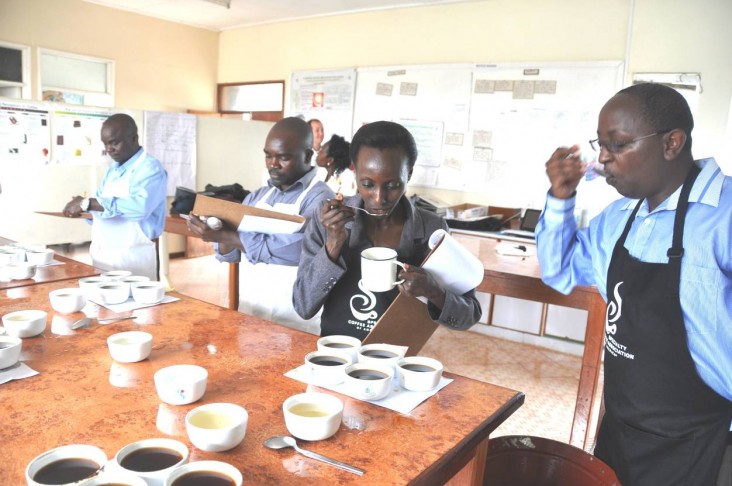
The African Fine Coffees Association (AFCA), in partnership with the Coffee Quality Institute (CQI) and USAID COMPETE, held its 7th annual Kenya National Taste of Harvest (ToH) Coffee Competition at the Coffee Research Foundation in Ruriu, Kenya, Jan. 28-30, 2013.
Rocky Rhodes, renowned coffee roaster and quality instructor from the United States, led a team of seven certified Kenyan “Q” Graders or qualified coffee cuppers, to examine and evaluate 74 Arabica coffees from 52 producers. “The Kenyan coffees rise above most others,” Rhodes said. “This coffee is magical.”
The annual competition identifies and recognizes the country’s specialty coffees with the best overall quality. Kenya’s coffee producers and millers were invited to submit their best samples for scoring on characteristics like aroma, acidity, clean cup composition, uniformity, balance and aftertaste. Judges convened for two days of quality evaluations, with loud slurping sounds filled the cupping room as they examined, smelled and deliberated over each coffee’s profile. Sixteen finalists advanced to the competition’s second round to be scored as Kenya’s top specialty coffees.
All coffees that receive scores of 80 or above (out of 100) are featured on the ToH website, providing instant visibility to specialty coffee buyers worldwide. Achieving top scores is highly competitive and the finest coffees may differ only by one or two points. Of this year’s contestants, all attained a score over 80.
Incentive to produce high quality specialty coffees is substantial – a 50 kilogram bag of specialty coffee can sell for more than USD $1,000 in Kenya compared to the benchmark prices of less than half that value.
In the past, ToH winners have nearly always been smallholders. Small-scale producers excel in specialty coffee because they tend to give more attention and care to sorting and processing, says AFCA coffee specialist Wycliffe O. Murwayi. This level of attention to detail is essential for specialty coffee.
“Commercial growers can afford to have some defective beans because they are mixed and processed in bulk,” says Rhodes. “Specialty coffee, on the other hand, is judged for the quality of each and every bean.”
“Certainly there has been an overall increase in quality Kenyan coffee since the Taste of Harvest started,” says Joseph Kithinji, ToH judge for the seventh straight year. “Growers have more of an incentive to produce high quality beans and are reaping the benefits.”
For first-time judge Hilda Njeri Mwangi, ToH is “preparing people to meet quality standards right from the farm and along the whole value chain.”
Over the last nine years, AFCA, with support from USAID COMPETE, has worked closely with the Kenyan coffee industry to improve the entire coffee value chain – from planting to harvest and processing. As AFCA’s flagship program, ToH has helped improve the reputation of Eastern Africa’s coffee worldwide.
Murwayi says that ToH is making its mark and linking more quality coffees to the market: “When we go to international trade fairs, of course everyone wants to see ToH coffees.”
For more information on the Kenya National ToH Competition and to view the results, please visit www.africantoh.org.







Comment
Make a general inquiry or suggest an improvement.